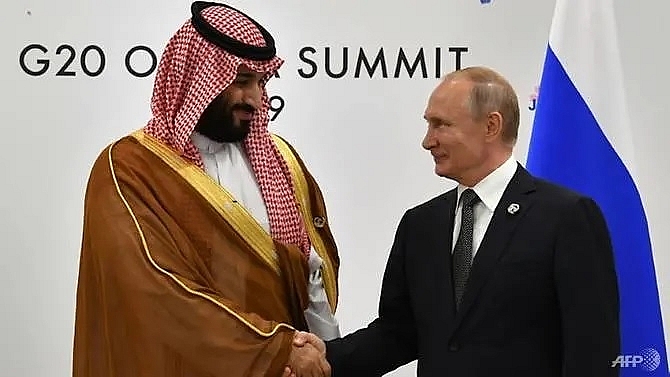Oil, Iran top agenda as Putin visits Saudi Arabia
 |
| Putin's meeting with Saudi Arabia's Crown Prince Mohammed bin Salman comes at a time of increasing instability in the Middle East. (Photo: AFP/Yuri Kadobnov) |
The meeting with King Salman and Crown Prince Mohammed bin Salman comes following attacks on Saudi oil installations that Riyadh and the US have blamed on Iran, an ally of Moscow.
Oil will be "the main topic of discussion" between the leaders, Russian political analyst Fydor Lukyanov said, as a deal between the 24 members of the Organization of the Petroleum Exporting Countries (OPEC) is due to expire next spring.
Russia is not a member of OPEC, headed by Saudi Arabia, but it has worked closely with the group to limit supply and push up prices after a 2014 slump that badly hit the Russian economy.
Moscow and Riyadh - a traditional ally of Washington - have made a striking rapprochement in recent years, marked in particular by King Salman's first visit to Russia in October 2017.
A year later, when Crown Prince Mohammed bin Salman was under fire after the assassination of the journalist Jamal Khashoggi in Turkey, Vladimir Putin went out of his way to shake his hand at a G20 summit, to much comment.
In an interview with Arabic-language television channels ahead of his visit, Putin praised his good relations with the King and Crown Prince.
"We will absolutely work with Saudi Arabia and our other partners and friends in the Arab world ... to reduce to zero any attempt to destabilise the oil market," he said in the interview broadcast Sunday.
'ROLE OF PEACEMAKER'
Analyst Lukyanov said that Moscow - with its older ties to Iran as new links with Saudi - could "play the role of peacemaker" as tensions between Tehran and Riyadh continue to rise.
These tensions spiked last month after the attacks on Saudi oil facilities that initially halved the kingdom's crude output and set oil markets alight.
Yemen's Huthi rebels claimed responsibility, but US officials blamed Iran and said the rebels did not have the range or sophistication to target the facilities.
Tehran has denied involvement and warned of "total war" in the event of any attack on its territory.
Russia attempted to keep a foot in both camps - proposing missiles to Riyadh to defend itself, while at the same time warning against "hasty conclusions" regarding Iranian involvement.
Last week an Iranian tanker was hit by suspected missile strikes off the coast of Saudi Arabia, sparking fresh conflict fears.
"As far as Russia is concerned, we will do everything possible to create the necessary conditions for a positive dynamic" aimed at easing tensions, Putin said in the interview broadcast Sunday.
SYRIA
Kremlin adviser Yuri Ushakov said the Syria conflict would also feature in the leaders' talks on Monday.
Russia and Iran are allied with the regime of Bashar al-Assad, while the Saudis support the opposition.
But "it is important for Russia that an Arab country participates in the political settlement in Syria," said Lukyanov.
So far "only three non-Arab countries" - Turkey, Russia and Iran - are hosting talks, he said.
In terms of business, the visit is expected to result in around 30 agreements and contracts, according to Ushakov.
Around a dozen of these - in the advanced technology sectors, energy and infrastructure - will be signed by the Russian Sovereign Fund and are worth around US$2 billion.
In October 2017, Russia and Saudi Arabia also signed a memorandum of understanding paving the way for Riyadh's purchase of Moscow's powerful S-400 anti-aircraft missile systems.
The sale never materialised, however, as Saudi Arabia eventually opted to purchase a US system.
After Saudi Arabia, Vladimir Putin will travel to the United Arab Emirates on Tuesday to meet the Crown Prince of Abu Dhabi, Mohammed bin Zayed Al-Nahyan.
What the stars mean:
★ Poor ★ ★ Promising ★★★ Good ★★★★ Very good ★★★★★ Exceptional
Related Contents
Latest News
More News
- France supports Vietnam’s growing role in international arena: French Ambassador (January 25, 2026 | 10:11)
- Foreign leaders extend congratulations to Party General Secretary To Lam (January 25, 2026 | 10:01)
- Russian President congratulates Vietnamese Party leader during phone talks (January 25, 2026 | 09:58)
- Worldwide congratulations underscore confidence in Vietnam’s 14th Party Congress (January 23, 2026 | 09:02)
- Political parties, organisations, int’l friends send congratulations to 14th National Party Congress (January 22, 2026 | 09:33)
- 14th National Party Congress: Japanese media highlight Vietnam’s growth targets (January 21, 2026 | 09:46)
- 14th National Party Congress: Driving force for Vietnam to continue renewal, innovation, breakthroughs (January 21, 2026 | 09:42)
- Vietnam remains spiritual support for progressive forces: Colombian party leader (January 21, 2026 | 08:00)
- Int'l media provides large coverage of 14th National Party Congress's first working day (January 20, 2026 | 09:09)
- Vietnamese firms win top honours at ASEAN Digital Awards (January 16, 2026 | 16:45)

 Tag:
Tag:




















 Mobile Version
Mobile Version